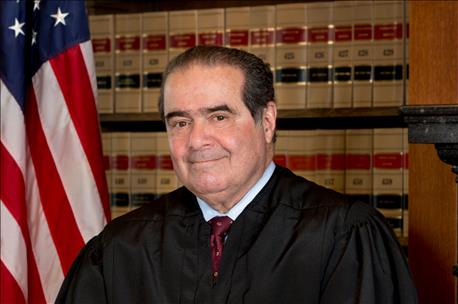
The unexpected death of Supreme Court Justice Antonin Scalia could have a lasting impact on agriculture, especially as key environmental cases were likely to be heard in the near future with Scalia imparting his conservative viewpoint.
The loss could shift the balance on how the court approaches some of the most significant water rules of this administration’s tenure. And without a deciding vote, it could mean fewer cases bring changes.
RELATED STORY: Supreme Court vacancy could impact TPP passage and ag policy issues
Just days before his death, Scalia joined the court in placing a stay on the administration’s Clean Power Plan.

Scalia’s death, and his eventual replacement, could impact several major court cases affecting agriculture, including litigation concerning the regulatory reach of the Clean Water Act challenging the EPA's Waters of the U.S. rule and TMDL diets in the Chesapeake Bay. TPP may also take a back seat if Senate infighting consumes the remainder of the legislative calendar ahead of this year's elections.
The Supreme Court will decide this spring whether or not to hear the agricultural industry’s challenge to the Environmental Protection Agency’s Chesapeake Bay Total Maximum Daily Load (TMDL) brought by the American Farm Bureau Federation. Should the Supreme Court hear this case, but stalemate at a 4-4 vote, the EPA limits will stand as enacted.
Additionally, Scalia’s support was expected during the Farm Bureau’s challenge to the Clean Water Act, commonly referred to as Waters of the U.S. (WOTUS). The eight remaining justices are expected to determine whether or not to hear the AFBF case. Originally they had planned to decide during a Friday, February 19 conference, but that was delayed. Court actions on this issue are more difficult to predict as multiple circuits are reviewing this case.
“While the makeup of the court has changed, we will continue to ask the court to review the case American Farm Bureau Federation v. EPA,” said Don Parrish, American Farm Bureau Federation’s senior director of regulatory relations. “The case stands on its own merits and addresses important constitutional issues. We remain confident our case will be granted that review.”
The justification for the Environmental Protection Agency’s waters of the U.S. rule stems from the Supreme Court decision in the Rapanos v. United States which challenged federal jurisdiction in regulating isolated wetlands. In the court’s split decision, Scalia wrote on behalf of four justices that the Clean Water Act’s definition of “navigable waters” applies to any parcel of land or water that drains to or is in the extended watershed of navigable waters.
It was Scalia who first used the word “navigable waters” and led the EPA to try to further define what constitutes a navigable water in its latest rule.
“Justice Scalia’s Rapanos opinion is a very important opinion which reflects the authority and limits Congress authorized within the Clean Water Act. It stands in stark contrast to EPA’s vague and over-reaching WOTUS rule,” said Parrish.
Parrish stated Justice Scalia was a “true defender of the constitution and he will be missed by America’s farmers and ranchers.”
The debate over Scalia’s successor will also likely push back Congressional negotiations on other agricultural topics, including the Trans-Pacific Partnership agreement. Beyond this interim period, Scalia’s replacement and the resulting makeup of the Supreme Court could require reconsideration of current strategies and assessments on environmental law and policy on multiple fronts.
“Federal agencies wield tremendous power and the regulations they issue have dramatic impacts on the lives of ordinary Americans. The next nominee to the Supreme Court should have a track record in the area of administrative law, and that track record should show a tendency to hold federal agencies accountable to operate within the boundaries set by Congress, including respect for those regulatory powers reserved for the states,” Parrish stated.
Senate Judiciary Committee chairman Chuck Grassley, R-Iowa, said it has been standard practice over the last nearly 80 years that Supreme Court nominees are not nominated and confirmed during a presidential election year. “Given the huge divide in the country, and the fact that this President, above all others, has made no bones about his goal to use the courts to circumvent Congress and push through his own agenda, it only makes sense that we defer to the American people who will elect a new president to select the next Supreme Court Justice,” Grassley said immediately following the news of Scalia’s death.
However, recent reports indicate Grassley may be willing to hold hearings on a nominee if one is made.
“The president has the authority, not the obligation, to nominate somebody, just as the Senate has the authority to consent or withhold consent. As Senator Grassley stated earlier, he believes that deference should be made to the American people who will elect a new president to select the next Supreme Court Justice,” said Grassley’s spokeswoman Beth Levine. “It seems odd that anybody would think it’s appropriate for Senate Republicans to signal to the White House precisely what the conference is going to do until at least they've had a chance to discuss it in person.”
About the Author(s)
You May Also Like






